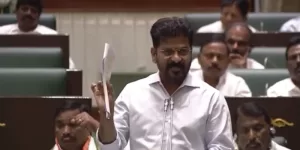Broadening his criticism of the Narendra Modi government’s alleged authoritarian impulses, Congress leader Rahul Gandhi said that the political fight in India is one between “Mahatma Gandhi’s vision” and his killer “Nathuram Godse’s vision”.
Gandhi, who is currently touring European nations, has consistently been attacking the Modi government for perpetuating divisiveness in the country and sheltering crony capitalist interests.
Interacting with the press in Brussels on Friday, September 8, he spoke about his meeting with European Parliamentarians in which he discussed the challenges India democracy is currently facing on economic and social fronts.
“…[W]e were giving them a sense of the type of challenges India is facing – economic challenges, other challenges, the general sort of attack on the democratic institutions,” Gandhi told the press.
“…[T]here is a full-scale assault on the democratic institutions of our country that everybody knows…And of course, minorities are under attack but so are many of the other communities – Dalit communities, tribal communities, lower caste communities are also under attack,” the Wayanad MP said.
“There is an attempt to change the nature of our country. Our country in the constitution is described as a union of states and we believe that the most critical aspect of our union is the conversation between members of our union. And there is an alternative vision, which is the BJP vision, which believes that power should be centralised, power should be concentrated, wealth should be concentrated and the conversation between members of the union…between people of India should be suppressed. And so, this is the fight between two visions. I like to term it the fight between Mahatma Gandhi’s vision and Nathuram Godse’s vision, Nathuram Godse being the person who assassinated our leader,” he summed up.
He, however, added, “The democratic fight and the fight for democracy in India is ours, and it’s our responsibility. And we will take care of it, and we will make sure that the sort of onslaught on our institutions and on our freedom is stopped. The Opposition will make sure it happens.”
He said that the aim of his visit is to meet the Indian diaspora in Europe, and “to get a sense” of how they viewed India and what it should be doing in the future. He also extensively spoke about his over 4,000-kilometre-long Bharat Jodo Yatra, and the opposition efforts to come together. He said that the INDIA bloc has unnerved the government, and that is why it has been attempting to deflect attention from pertinent issues towards vacuous issues like changing the name of the country, and so on.
“I met thousands and thousands of youngsters…The three things they said were, number one, unemployment, number two, huge increase in the levels of poverty and completely skewed income distributions, so few people getting very very wealthy and the bulk of people being pushed back into poverty; and then there are rising prices and inflation…The fact of the matter is that India has the highest unemployment that it has had in the last 40 years, so that is something clearly wrong with our economic model. It’s not accepted and there is a lot of media support for the government, so those types of things don’t come out. But I don’t think the current path we are on, the economic path we are on, is sustainable in any way and there will certainly be consequences and a backlash to this model,” he said.
“We value the voice of the people, we value the voice of poor people, we value the voice of all stakeholders, and we want to hold a conversation with stakeholders before we make decisions. It is sometimes slower but in the long run, it works out much better. And that is really the conflict that is taking place in India. They are of the view that you do not need to ask people, you just go ahead and slam everything through. But in our view, there are consequences,” Gandhi said.
On the sidelines of his criticism, Gandhi also spoke about the need for an alternative economic vision which could challenge the Chinese “coercive” model of production.
“What the Chinese have basically shown is that it is possible to produce effectively in a coercive environment where you don’t give people freedom, where you restrict their freedom but you offer them prosperity without political freedom. And the challenge for us is can we provide an alternative vision where we do production under democratic conditions with political and economic freedom. And I think there is a lot of cooperation that can happen between the United States…between Europe and between us. And I think that’s where a lot of our focus should go – how can we create an alternative to the Chinese production model that is a coercive production model… a competitive vision,” Gandhi said.
Asked whether he is opposed to privatisation, he said, “We don’t have a problem with the private sector, we don’t have a problem with the government sector. Where we draw the line is where one or two people start to financially control the whole country. And where one or two people or three people are running everything, that’s where our problem begins.”
(Courtesy: The Wire.)




